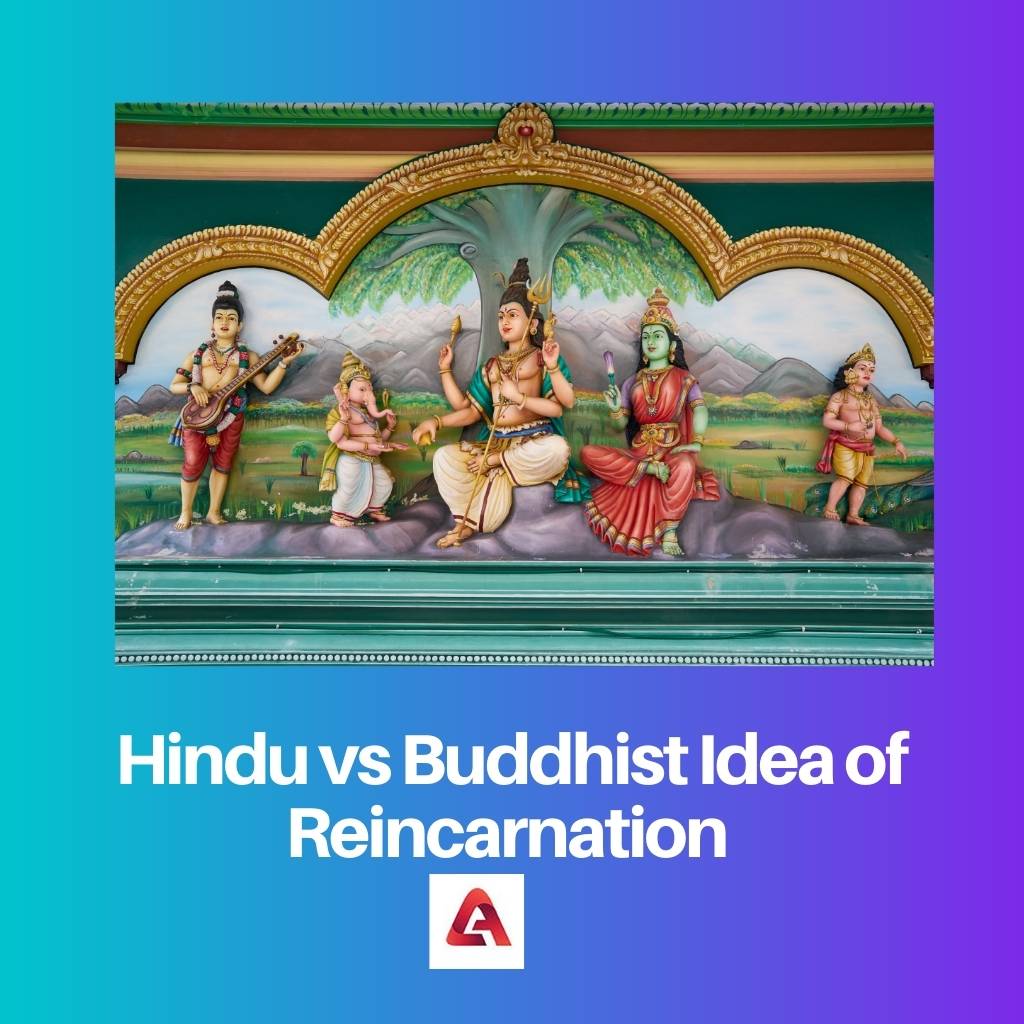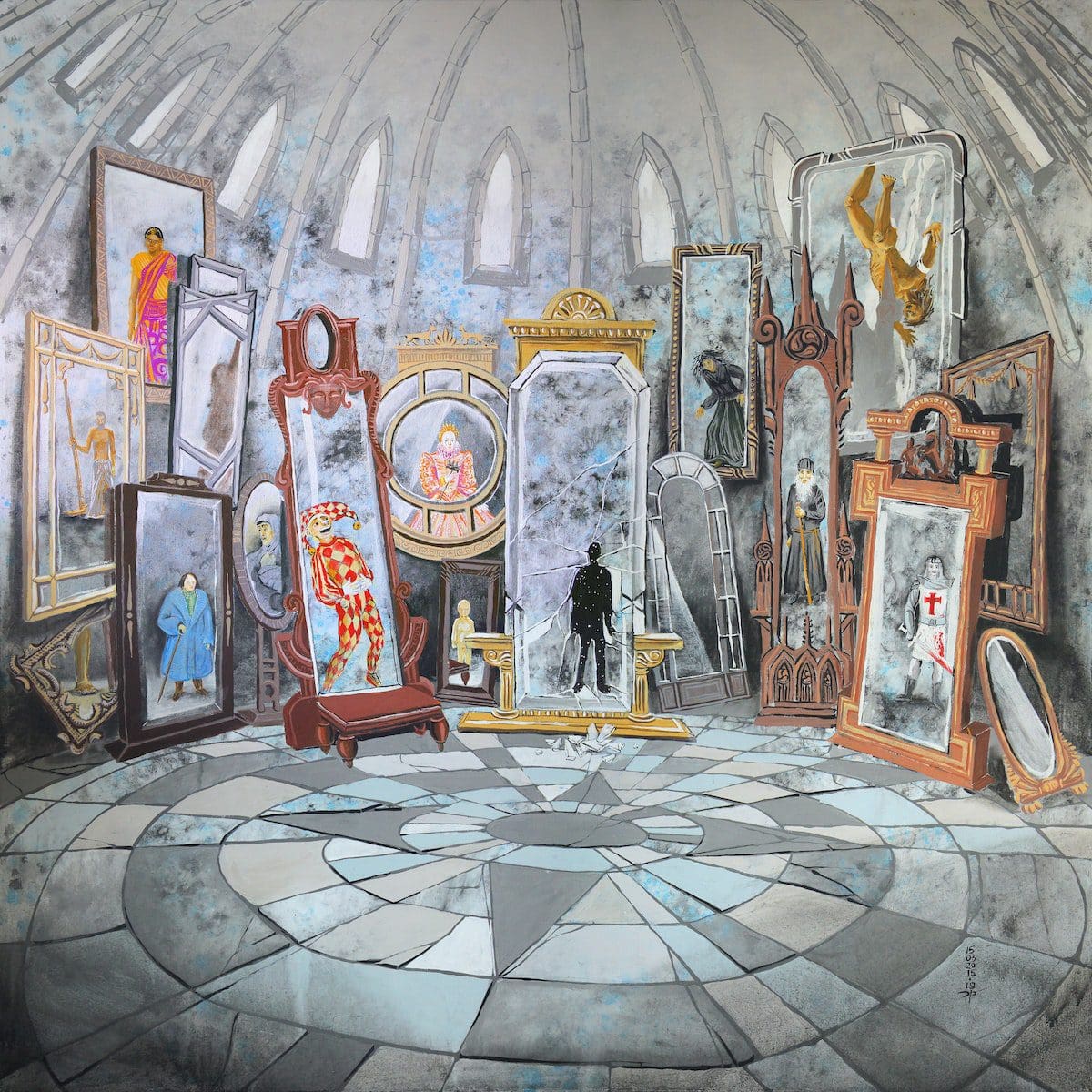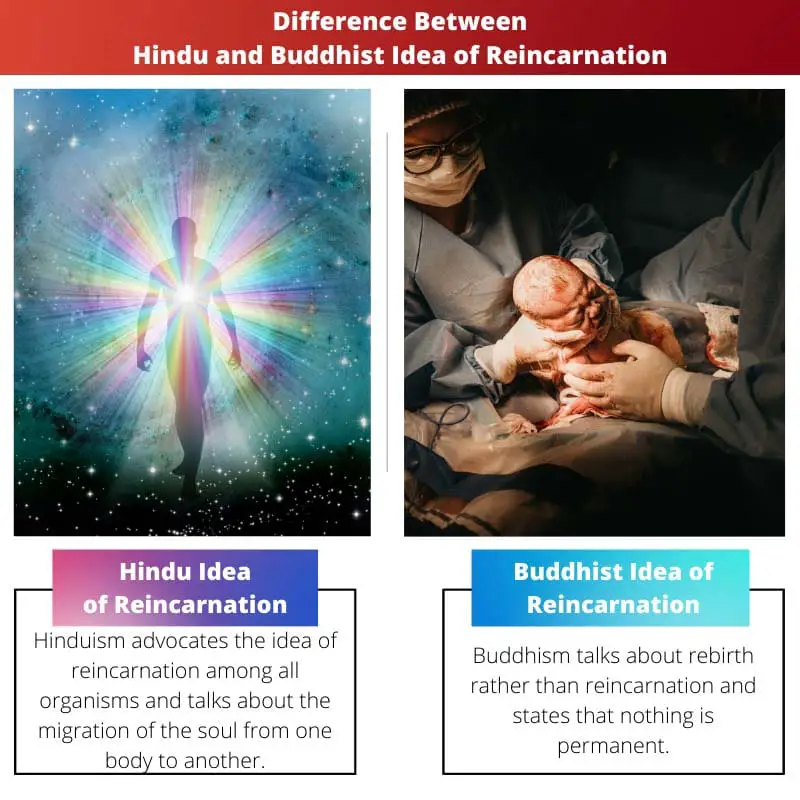Religion is something a person believes in and professes with all of its practices and values. Different religions give different opinions and theories about many things incorporated in them.
It is up to the people who practice a particular religion, what they need to follow and want to believe in.
Reincarnation is such a theory that confuses the people most among all religious beliefs. This theory talks about the rebirth of an individual after his death. However, different religions recognize this theory in different ways.
Similarly, the Hindu Idea of Reincarnation and the Buddhist Idea of Reincarnation are completely different from each other. This article shall be shedding light upon these topics.
Key Takeaways
- Hinduism believes in the existence of the soul, which is reincarnated after death.
- Buddhism believes in the existence of consciousness, which is reincarnated after death.
- Hinduism believes in the ultimate goal of moksha, or liberation from the cycle of reincarnation, while Buddhism believes in nirvana, or liberation from suffering.
Hindu vs Buddhist Idea of Reincarnation
The difference between the Hindu and Buddhist Ideas of Reincarnation is that the Hindu idea says that an individual comprises his body and soul, and after death, the soul frees itself and chooses another body just like cloth. While the Buddhist idea states that there is no soul migration from one body to another, and everything that makes up a person gets fitted in a newborn after his death.

In Hinduism, the religious texts demonstrate the idea of the existence of the Nondestructible soul. There is the belief that the soul is never fading substance; it just changes bodies one after another in the same way we change clothes.
The body is termed temporary, while the soul is permanent.
Buddhism, however, on the other hand, believes that there is no such thing as a non-destructible omnipresent soul. They believe that the body is made up of energy, mind, and other molecules, and after death, the body releases these things.
Comparison Table
| Parameters of Comparison | Hindu Idea of Reincarnation | Buddhist Idea of Reincarnation |
|---|---|---|
| Core belief | Hinduism advocates the idea of reincarnation among all organisms and talks about the migration of the soul from one body to another. | Buddhism talks about rebirth rather than reincarnation and states that nothing is permanent. |
| State of the soul | As per this belief, the soul exists in a permanent state. | As per this belief, nothing is permanent not even the soul. |
| Depends upon | It says reincarnation is based upon the deeds of a person during his lifetime. | It does not mention any such basis of rebirth. |
| Can be stopped by | As per this belief, reincarnation keeps taking place unless Moksha is attained. | As per this belief, rebirth keeps taking place unless Nirvana is attained. |
| The link between two lives | All of the lives of a person are interlinked together and, in every life, it is that same person only. | As per this idea, there is no interlinkage between all the lives and everything starts afresh. |
What is Hindu Idea of Reincarnation?
The theory of Reincarnation in Hinduism is found in the Vedic texts of the later era. As per this idea, every human, animal, bird, or even microorganism contains a soul inside of them.
This soul is also called the Atma and means the one true essence or piece of the living. Without it, there is no life. At the death of a living organism, this soul leaves that particular body and finds a new one.
This process has been compared to that of changing clothes in the Bhagwat Gita. This theory states that the outer appearance is just the disguise of the soul, and depending on a person’s deeds, he attains another disguise in another life.
If he has done good things, he shall be attaining a higher rank, such as a Human life. And in the opposite case, he can be an insect or an animal, but essentially, the individual remains the same throughout.
It says that the soul cannot be destroyed and created ever. It is said that if one attains Moksha, he can be free of this cycle. And the Moksha is attained when the person gets free of all his attachments and wants of Samsara.

What is Buddhist Idea of Reincarnation?
Buddhism, however, has primarily emerged from Hinduism only, but certain things have been adopted differently. The Buddhists do not believe in reincarnation, and rather, they propagate the theory of rebirth.
According to them, there is no permanent thing as soul or essence, and everything which makes up the body gets destroyed after death. While the rebirth occurs, everything starts afresh.
They believe that everything that makes the body of an organism destructs itself in particles and gets diluted in the universe. And when all the suitable conditions are found, these elements come together and give birth to a newborn.
This theory does not believe that one’s deeds control the nature of his rebirth and rather focuses on attaining Nirvana which is a state of getting rid of all human attachments.

Main Differences Between Hindu and Buddhist Idea of Reincarnation
- Hinduism advocates the idea of reincarnation among all organisms and talks about the migration of the soul from one body to another. In contrast, Buddhism advocates the idea of rebirth and states that nothing is permanent.
- As per the Hinduist Idea of Reincarnation, the soul exists in a permanent state. While as per the Buddhist Idea of Reincarnation, souls do not migrate from one body to another and are not permanent.
- The idea of Reincarnation in Hinduism depends upon a person’s deeds or Karma during his lifetime as it decides his future life however, in Buddhism, there is no interlinkage between the past and future life.
- The idea of Reincarnation in Hinduism says that unless Moksha is attained, reincarnation shall keep taking place. The idea of rebirth says that unless Nirvana is attained, rebirth shall keep taking place.
- The theory in Hinduism believes in the migration of the soul from one body to another, while in Buddhism, there is no such concept.

- https://www.cambridge.org/core/journals/sociology/article/reincarnation-modernity-and-identity/3889FFF0C7324A1017C03F6C8E2BE3FE
- https://www.ncbi.nlm.nih.gov/pmc/articles/PMC3705678/

The comparison table is very helpful in understanding the core beliefs of Hindu and Buddhist reincarnation. This article has provided clarity on the complex topic.
The article offers an illuminating comparison between Hinduism and Buddhism in relation to the concept of reincarnation. I appreciate the objective approach to discussing these complex beliefs.
The detailed description of the Hindu and Buddhist ideas of reincarnation is highly informative. The article effectively explores the nuances of these religious beliefs.
The detailed explanation about the difference in the two beliefs is very insightful. I appreciate the effort to provide the accurate information and educate the readers about the Hindu and Buddhist views on reincarnation.
I find this topic fascinating. Both Hinduism and Buddhism have fascinating views on reincarnation. I appreciate the clear comparison between the two belief systems.
The comprehensive explanation of the Hindu and Buddhist ideas of reincarnation is commendable. It’s an intellectually stimulating piece that encourages thoughtful contemplation.
The article does an excellent job of explaining the key differences between the Hindu and Buddhist views of reincarnation. It’s a thought-provoking read.
The explanation of the Hindu and Buddhist ideas of reincarnation is well-researched and articulated. I feel that I have a better understanding of these concepts after reading this article.
This article provides an in-depth analysis of the Hindu and Buddhist perspectives on reincarnation. The content is rich and enlightening, offering a stimulating read.
The information about the Hindu and Buddhist ideas of reincarnation is presented in a clear and concise manner. I’m impressed with the thoroughness of the article.